- 24/7 Free Consultation: (888) 424-5757 Tap Here To Call Us
How to File a Personal Injury Lawsuit in Illinois

This guide explains how to file a personal injury lawsuit, what to expect during the legal process, and why working with an experienced lawyer can improve your chances of success.
Filing a personal injury lawsuit in Illinois can help injured individuals recover compensation for medical bills, lost wages, and other damages caused by someone else’s negligence. Whether the injury occurred in a car accident, on unsafe property, or due to a defective product, understanding the legal process is essential.
What is a Personal Injury Lawsuit?
A personal injury claim is a legal action filed by an individual who has been harmed due to someone else’s negligence or wrongful conduct. These cases cover a wide range of incidents, including car crashes, slips and falls, medical malpractice, and workplace injuries.
The goal is to seek compensation for physical injuries, emotional distress, and financial losses. A successful personal injury claim requires proving that the other party was at fault and that the injuries resulted directly from their actions.
Why File a Personal Injury Lawsuit?
Filing a personal injury claim allows injured individuals to pursue compensation for medical bills, lost wages, pain and suffering, and other losses. It also holds the responsible party accountable for their negligence or misconduct.
Legal action may be necessary when an insurance company refuses a fair settlement or denies a valid claim. By pursuing a legal claim, victims can secure the resources they need for recovery and safeguard their rights under the law.

Personal Injury Law in Illinois
Illinois personal injury law allows individuals to file a claim when harmed due to another party’s negligence. The state follows a modified comparative fault rule (735 ILCS 5/2-1116), meaning a plaintiff can recover damages as long as they are less than 51% at fault.
Illinois also imposes a two-year statute of limitations for most personal injury cases (735 ILCS 5/13-202), making timely action essential. Understanding state-specific rules is key to preserving a claim and recovering fair compensation.
Our Firm’s Expertise in Illinois Personal Injury Cases
Rosenfeld Injury Lawyers has extensive experience handling personal injury cases across Illinois. Our experienced personal injury lawyer team has recovered compensation for clients in a wide range of injury claims, from car crashes to complex medical malpractice cases.
We understand the legal process, court requirements, and how to effectively deal with insurance companies. Our firm is committed to securing maximum compensation for injured clients and guiding them through every step of their legal journey.
Determining if You Have a Valid Personal Injury Case
Before filing a lawsuit, it’s essential to evaluate whether the legal elements necessary for a valid claim are present.
A successful case must establish that the defendant had a legal duty, failed to meet that duty, caused your injuries through that failure, and that you suffered actual damages. Understanding these core elements—duty of care, breach, causation, and damages—can help you determine if pursuing a personal injury claim is appropriate for your situation.
Duty of Care: Did the Defendant Owe You a Duty of Care?
In a personal injury case, you must first establish that the defendant owed you a duty of care. This means they had a legal obligation to act in a reasonably safe manner.
For example, drivers must operate vehicles safely, and owners must maintain safe premises. If a relationship exists where a reasonable person would foresee harm, such as a doctor-patient or driver-pedestrian situation, then a duty of care likely applies.
Breach of Duty: Did the Defendant Fail to Uphold Their Duty of Care?
A breach of duty occurs when the defendant fails to act as a reasonable person would under the same circumstances. This could mean a driver ran a red light, a store failed to clean up a spill, or a doctor made a grave error in treatment.
Proving a breach often involves showing what the defendant did or didn’t do, compared to how a prudent person or professional would have acted in a similar situation.
Causation: Did the Defendant’s Negligence Cause Your Injuries?
You must show that the defendant’s breach of duty directly caused your injuries. This involves proving two types of causation: actual cause (the injury would not have occurred but for the defendant’s actions) and proximate cause (the harm was a foreseeable result of the defendant’s conduct).
If you suffered an injury that was unrelated or too far removed from the defendant’s actions, causation may be complex to establish.
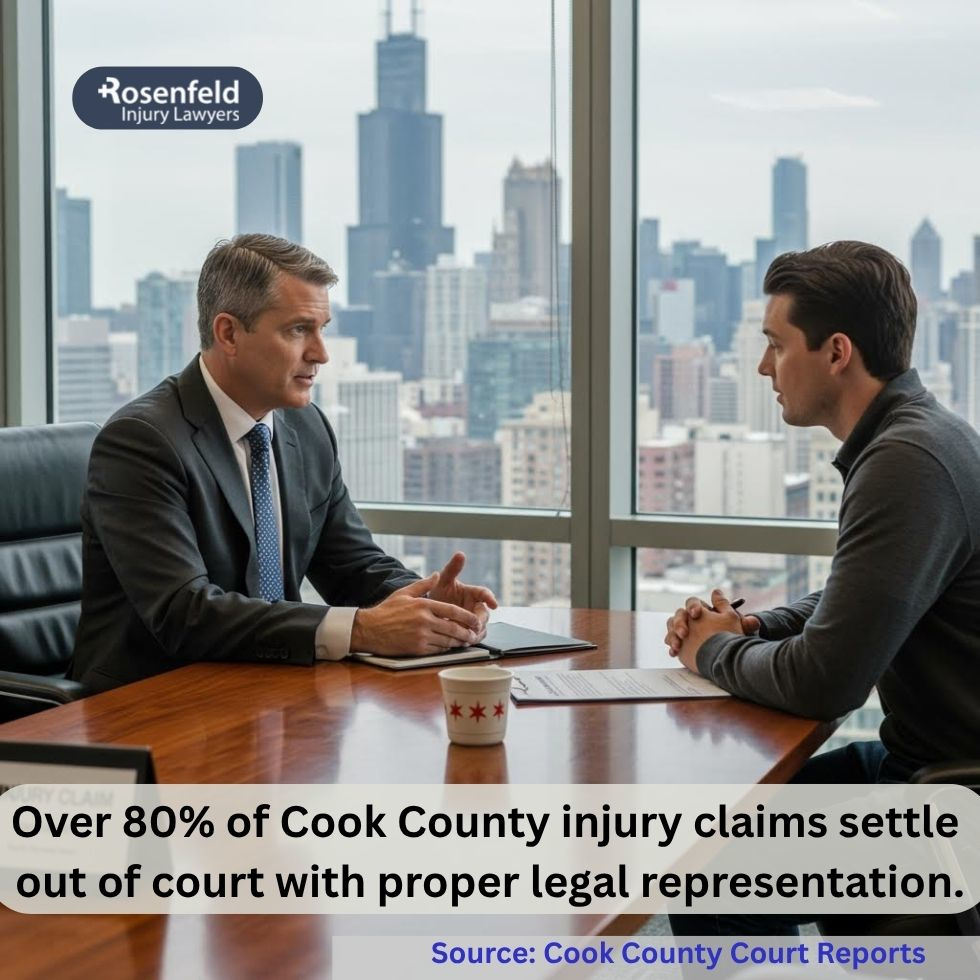
Damages: Did You Suffer Actual Damages as a Result of Your Injuries?
A personal injury claim requires proof that you experienced real, measurable losses. This includes medical expenses, lost income, and the cost of ongoing treatment. Non-economic damages, such as emotional distress or loss of enjoyment of life, may also be included.
Without documented harm, like hospital records, pay stubs, or testimony about pain and suffering, you may not have a valid claim, even if the other elements are present.
Common Types of Personal Injury Cases in Illinois
Personal injury law covers a wide range of incidents where someone is harmed due to another party’s negligence or misconduct. In Illinois, common types of personal injury cases include traffic accidents, slip and fall incidents, medical malpractice, and nursing home neglect.
Each type of case involves different legal standards and types of evidence, but all share the goal of helping injured victims recover compensation for their medical bills, lost wages, pain, and other damages.
Car Accidents
Car accidents are one of the most common sources of personal injury claims in Illinois. When a driver fails to follow traffic laws, such as speeding, texting while driving, or driving under the influence, they may be considered negligent. If that negligence causes an accident that results in injuries, the at-fault driver can be held legally responsible. Victims may seek compensation for medical expenses, vehicle damage, lost income, and other losses stemming from the crash.
Slip and Fall Accidents (Premises Liability)
Slip and fall cases fall under premises liability, which holds property owners responsible for keeping their premises safe. If a store, business, or landlord fails to fix hazards like wet floors, uneven pavement, or poor lighting, they may be liable when someone is injured.
The key legal question is whether the owner knew or should have known about the dangerous condition and failed to address it in a reasonable timeframe.
Medical Malpractice
Medical malpractice involves a healthcare provider failing to meet the accepted standard of care, resulting in patient harm. This could include surgical errors, misdiagnoses, delayed treatment, or medication mistakes.
In Illinois, pursuing a medical malpractice lawsuit requires an affidavit of merit from a qualified medical expert. These cases are complex and often involve significant injuries or wrongful death, making legal support essential for proving negligence and securing fair compensation.
Product Liability
Product liability cases arise when a defective product causes injury. These claims can involve design defects, manufacturing errors, or inadequate warnings. Manufacturers, distributors, and retailers may all be held responsible if their product is found to be unreasonably dangerous.
Illinois law allows injured consumers to seek compensation for medical bills, lost income, and other damages when a faulty product, such as a car part, toy, or appliance, leads to harm.
Nursing Home Abuse and Neglect
Nursing home abuse and neglect cases involve harm caused by inadequate care, neglect, or intentional mistreatment of elderly residents. Staff may be held liable for failing to provide basic hygiene, medication, or supervision.
Facilities can also be responsible for understaffing or hiring unqualified employees. Victims and their families can seek compensation for physical injuries, emotional trauma, and in some cases, wrongful death, under Illinois personal injury and elder abuse laws.
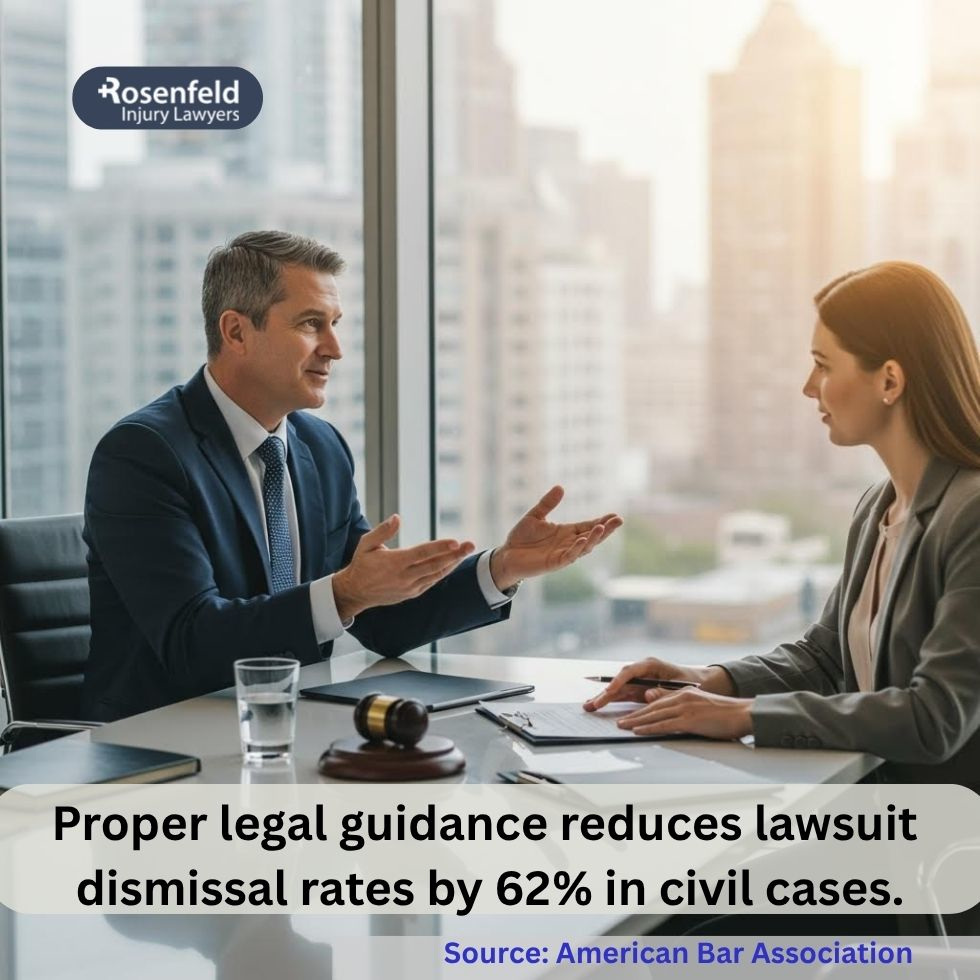
Dog Bites and Animal Attacks
In Illinois, dog owners are generally liable for injuries their pets cause, even if the animal has no history of aggression. If a dog bites someone who was lawfully on public or private property and did not provoke the animal, the owner can be held responsible.
Injuries may include puncture wounds, infections, and scarring. Victims can file a personal injury claim to recover costs associated with medical treatment, lost wages, and emotional distress.
Construction Accidents
Construction sites are dangerous environments, and accidents frequently occur due to falls, equipment malfunctions, or safety violations. Injured workers may be entitled to workers’ compensation, but in some cases, third-party personal injury claims can be filed against subcontractors, equipment manufacturers, or site owners.
Common injuries include fractures, burns, and spinal damage. These cases often involve complex liability issues and require careful investigation to determine who is legally responsible.
The Illinois Statute of Limitations for a Personal Injury Claim
Understanding the statute of limitations is critical when filing a lawsuit in Illinois. This legal deadline determines how long you have to take action after an injury.
If you wait too long, you could lose your right to recover compensation, no matter how strong your case may be. Illinois law sets specific time limits for different types of cases, with some exceptions that may apply depending on your circumstances.
General Statute of Limitations for Personal Injury
In most personal injury cases in Illinois, you have two years from the date of the injury to file a lawsuit. This applies to claims arising from car crashes, slip and falls, medical negligence, and other injuries caused by someone else’s actions. If you do not file within this two-year window, the court is likely to dismiss your case, and you may be barred from recovering any compensation for your losses (735 ILCS 5/13-202).
Exceptions to the Statute of Limitations
There are a few exceptions that may extend the two-year deadline. For instance, if the injured person is a minor at the time of the incident, the clock usually starts on their 18th birthday.
In cases where the injury or harm was not immediately apparent, such as a delayed diagnosis in a medical malpractice claim, the statute may begin when the injury is discovered or should have reasonably been discovered. These exceptions are narrow and should be reviewed carefully.
Statute of Limitations for Specific Types of Cases
Different personal injury claims may have different time limits. For example:
Medical malpractice claims generally follow the two-year rule, but must also be filed within four years of the act or omission, regardless of when discovered (735 ILCS 5/13-212).
Wrongful death cases must also be filed within two years from the date of death (740 ILCS 180/).
Claims against government entities may require a formal notice within one year, with shorter deadlines to file suit (745 ILCS 10/).
Consulting a personal injury attorney can help clarify the timeline specific to your case.
Steps to Take Before Filing a Personal Injury Lawsuit
Before you begin the process, there are key steps you should take to strengthen your claim. Proper documentation, communication, and preparation can improve your chances of recovering fair compensation. These early actions serve as the foundation for any personal injury claim and help demonstrate the full impact of your injuries on your life.
Seek Medical Attention and Document Your Injuries
Always seek immediate medical attention after an accident, even if injuries seem minor. A prompt medical evaluation helps protect your health and creates an official record of your injuries.
Delayed treatment can weaken your claim, as insurance companies may argue your injuries were not serious. Request copies of medical records, doctor’s notes, and treatment plans. This documentation will be crucial when proving the extent and cause of your injuries during the process.
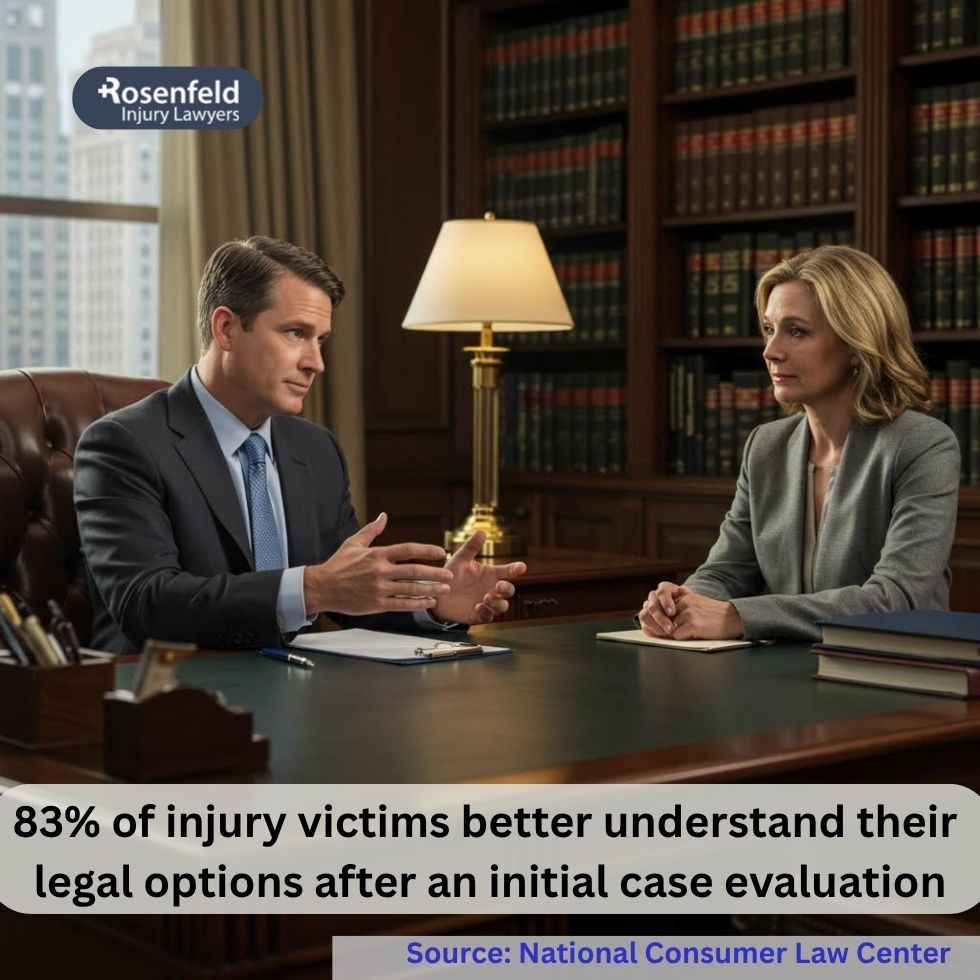
Gather Evidence: Photos, Witness Statements, Police Reports
Collect as much evidence from the scene as possible. Take clear photos of your injuries, property damage, and the accident location. If anyone witnessed the incident, ask for their contact information and a brief written or recorded statement.
In car crashes or criminal-related injuries, request a copy of the police report. These pieces of evidence help support your version of events and show how the injury occurred.
Notify Relevant Parties (e.g., Insurance Companies)
Promptly notify your own insurance company and, if applicable, the at-fault party’s insurer. This is an important step, especially in car accident and premises liability cases. Provide basic details about the incident, but avoid giving recorded statements or signing anything without legal advice.
Also, notify your employer in work-related injury cases. Early communication helps initiate the claims process and preserves your right to seek compensation.
Keep Detailed Records of Expenses and Losses
Document all financial losses related to your injury. This includes medical bills, prescription costs, transportation to appointments, and lost income from missed work. Keep receipts, invoices, and pay stubs to support your claim.
Also note any non-economic impacts, such as emotional distress or limitations on daily activities. These records are essential when calculating damages and presenting a complete picture of how the injury affected your life.
The Legal Process
Once you’ve taken the necessary steps to prepare, the process of filing a personal injury claim begins. This process includes multiple phases, from initiating the lawsuit to exchanging evidence and attending court hearings. Each step must be carefully handled to preserve your claim and move your case toward resolution, whether by settlement or trial.
Drafting and Filing the Complaint
The complaint is the legal document that starts the lawsuit. It outlines your allegations against the at-fault party, describes how the injury occurred, and lists the damages you’re seeking. It must be filed in the appropriate Illinois court and follow all formatting and content rules.
A properly drafted complaint establishes the defendant’s liability and your legal basis for seeking compensation. Filing fees must be paid when submitting the complaint to the court.
Serving the Complaint on the Defendant
After filing the complaint, you must formally serve it on the defendant, along with a summons. This notifies them of the lawsuit and their obligation to respond. Service can be completed by a sheriff, private process server, or by certified mail in some cases.
Proper service is critical; without it, the court cannot proceed. If the defendant cannot be located, alternate service methods may be requested from the court.
The Defendant’s Response: Answer or Motion to Dismiss
The defendant typically has 30 days to respond after being served. They can file an “answer,” admitting or denying each claim, or file a motion to dismiss, arguing the case should be thrown out due to legal deficiencies.
A motion to dismiss doesn’t address the facts but challenges the legal basis of the lawsuit. If the court denies the motion, the case proceeds, and the defendant must then file an answer.
Discovery: Exchanging Information
Discovery is the formal process of exchanging information relevant to the case. This includes written questions (interrogatories), document requests, and depositions, where witnesses give sworn testimony.
Discovery allows both sides to examine the evidence and understand each other’s positions. It’s a critical phase for building a strong case or preparing for negotiations. The process can take several months, depending on the complexity of the injury and the number of parties involved.
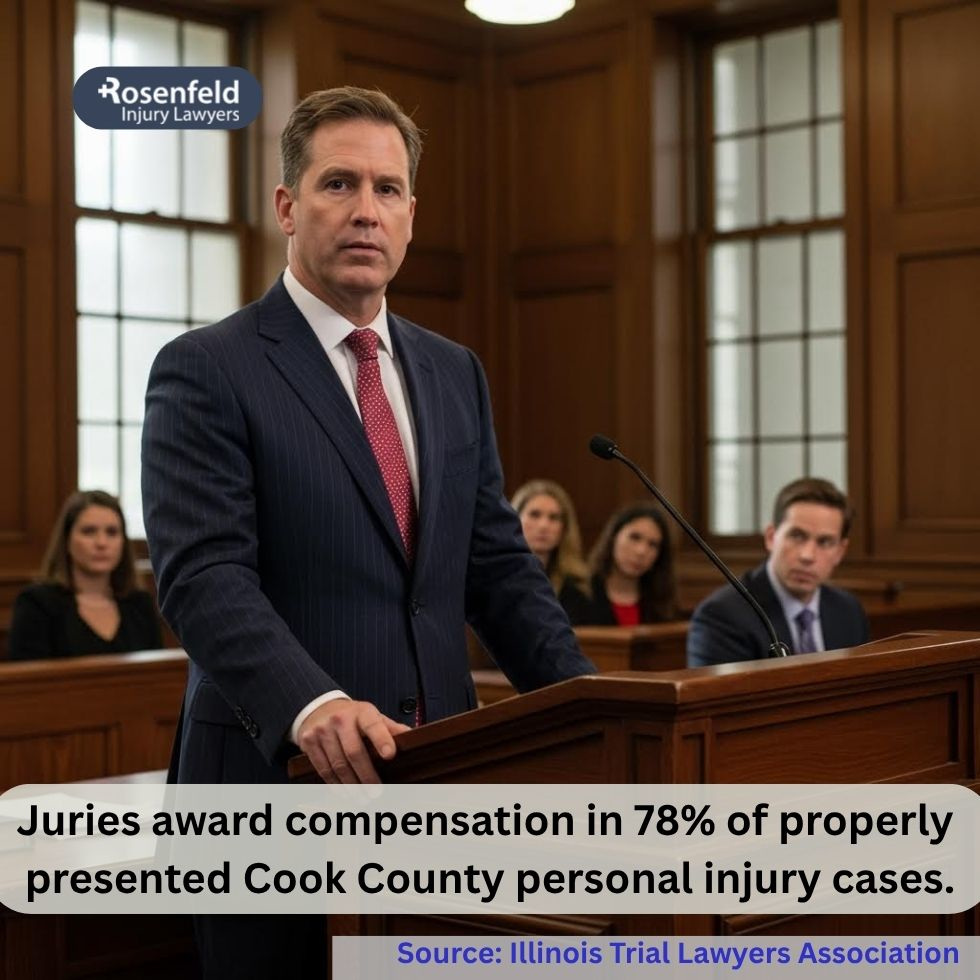
Motions and Court Hearings
Throughout the case, both sides may file motions to resolve legal issues or disputes before trial. Common motions include requests to exclude evidence, compel discovery, or dismiss part of the case.
The court may schedule hearings to consider these motions. Some motions, like summary judgment, seek to end the case without trial by arguing that the facts are undisputed and one side is entitled to judgment as a matter of law.
Settlement Negotiations
Settlement negotiations often begin after the discovery phase, once both sides have reviewed the evidence. The injured party, usually through their personal injury attorney, will send a demand letter to the at-fault party’s insurance company outlining the injuries, damages, and requested compensation.
The insurance company may respond with a counteroffer. Negotiations can continue back and forth until a fair settlement is reached. Most personal injury cases are resolved this way, avoiding the uncertainty, time, and expense of going to trial.
Going to Trial: What to Expect
If your personal injury case proceeds to trial, it begins with jury selection, where attorneys choose impartial jurors. Next are opening statements, where each side outlines its case. The plaintiff then presents evidence and calls witnesses, followed by the defense doing the same. Cross-examination may challenge credibility or facts. After both sides rest, closing arguments summarize the case and highlight key points.
The jury then deliberates to reach a verdict based on the evidence. If the jury awards damages, the defense may file post-trial motions to alter or overturn the ruling. Either side can also appeal the outcome to a higher court, which could prolong the process depending on the issues raised on appeal.
Damages in Illinois Personal Injury Cases
In Illinois personal injury cases, compensation may include both economic and non-economic damages. Economic damages cover measurable losses such as medical bills, lost income, and future medical expenses. Non-economic damages compensate for pain and suffering, emotional distress, and loss of enjoyment of life.
In rare cases involving intentional harm or gross negligence, punitive damages may be awarded to punish the wrongdoer. The amount depends on the severity of the injury, the impact on your life, and supporting evidence.
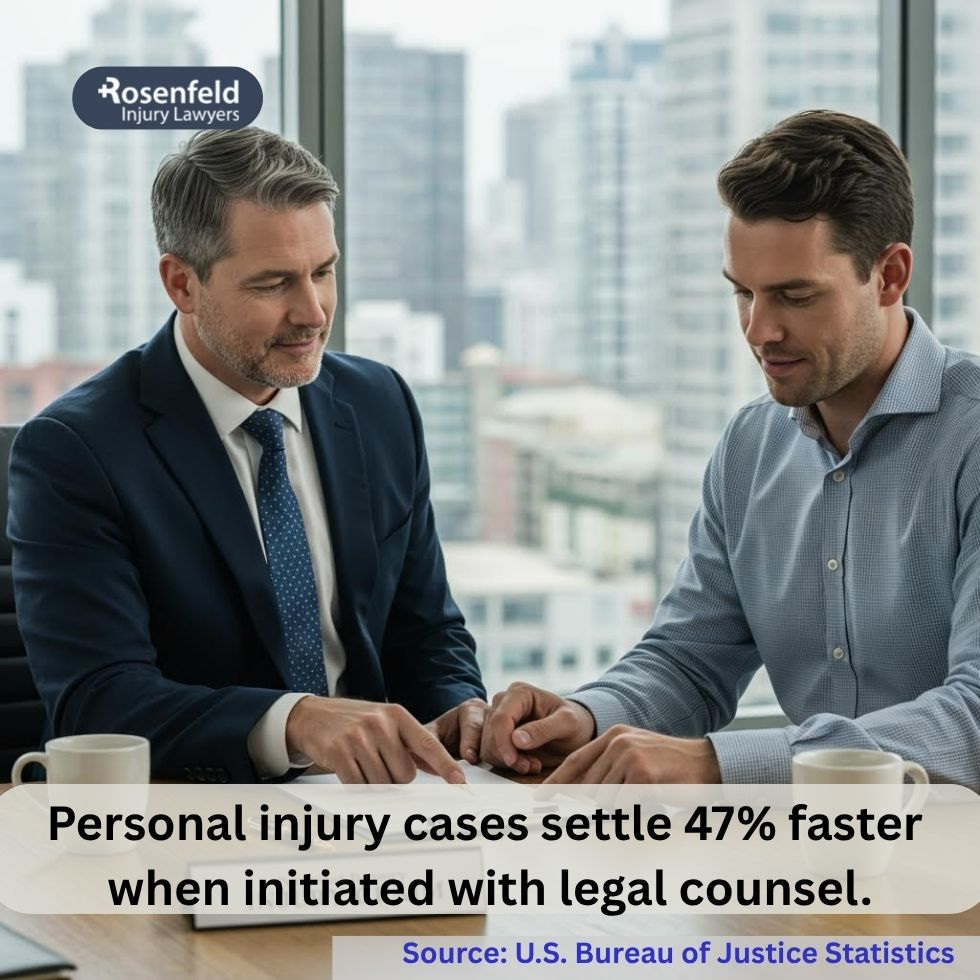
Our Extensive Experience in Illinois Personal Injury Law
At Rosenfeld Injury Lawyers, we bring years of experience representing injured individuals across Illinois. Our legal team has successfully handled thousands of personal injury claims involving car accidents, medical malpractice, slip and fall incidents, and more.
We understand the strategies used by insurance companies and are committed to securing the maximum compensation for our clients. With a proven track record of verdicts and settlements, we are dedicated to protecting your rights at every stage of the process.
Contact a Personal Injury Attorney For Legal Help With Your Claim

If you’ve been injured due to someone else’s negligence, Rosenfeld Injury Lawyers is here to help. Our skilled personal injury attorneys will review your case, explain your legal options, and fight for the compensation you deserve. We offer free consultations, and you pay nothing unless we win.Call our Chicago personal injury lawyers at (888) 424–5757 or fill out our contact form to schedule your initial consultation. Let us help you take the next step toward recovery.
All content undergoes thorough legal review by experienced attorneys, including Jonathan Rosenfeld. With 25 years of experience in personal injury law and over 100 years of combined legal expertise within our team, we ensure that every article is legally accurate, compliant, and reflects current legal standards.







